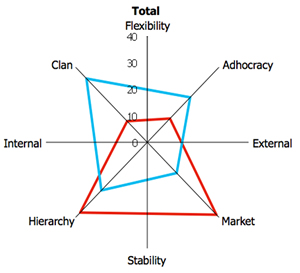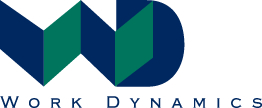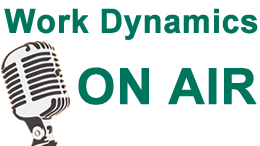News
ENGAGING IN ORGANIZATIONAL CHANGE: START WITH CULTURE
By Marcella Bremer, Work Dynamics’s guest Executive Organizational Psychologist

It’s recognizable enough: Organizational development and change programs often don’t deliver as promised. Change is often conducted in an “old-fashioned way” stemming from an industrial-age mindset. Ingredients: A linear world view (reality can be planned for and big change requires big efforts), change designed by an exclusive team (who tell the others what to change) and rolled out in a top-down way, creating resistance or sabotage as expected - because that’s not the way people are used to do things around here.
Large change initiatives hardly ever consider operationalizing abstract values or slogans to personal behavioral change, let alone including everyone and engaging them to share their information and energy to co-create meaningful, practical change. Change that could be tiny, one small habit at a time, but that could create massively different outcomes if a critical mass did it - which is non-linear and could yield profits or opportunities that you couldn’t have foreseen.
A fairy tale? I don’t think so. I started working with culture because I wanted to make a difference, not just make a living. Culture can be a major roadblock to change: pulling people back to their old comfortable ways of doing things. People in groups tend to copy, coach and correct one another to keep doing what they always did. Why not use this powerful copy-mechanism to practice new behaviors in small groups and support each other to keep doing so? People hold the key to successful organizational change because they have to change some typical behaviors, or nothing will change at all.

My approach to create sustainable change is to engage all employees in small teams (circles of 10). Within these change circles, people work on the what and the how of change, take ownership of their part (instead of obeying to top-down orders of change), while they benefit from peer support to really DO change and stick with it (even when it’s uncomfortable and tempting to go back to old habits).
OCAI starting point
To help people reach consensus on the “What” to Change, I often start with the Organizational Culture Assessment Instrument (OCAI - developed by Cameron and Quinn) that quickly maps culture. The OCAI is a validated and easy to use survey that scores culture in a quantitative way. The outcome is a culture profile that shows the mixture of culture types in the current and desired situation. Based on the Competing Values Framework, the OCAI maps the culture according to four archetypes of culture: the entrepreneurial, innovative Adhocracy culture, the people-oriented, friendly Clan Culture, the process-oriented, structured Hierarchy Culture and the results-oriented, competitive Market Culture. The culture types are easy to remember and have proven a handy starting point to raise awareness of values and human behaviors at work.
The What to change may be straightforward: “We need to become more market oriented, or we need to innovate.” The difference that makes the difference is in the HOW you change.
After the OCAI survey, I organize workshops or circles to hold a dialogue about the “What” but especially about the “How” to Change. We discover the typical beliefs and behaviors that make up current culture: we operationalize abstract values to daily behaviors.
Next, we check for future challenges and goals and develop the most effective preferred culture including its crucial and typical behaviors.
Together, we engage in the puzzle of how to change our daily habits to help the organizational system change toward the preferred culture and desired results.
The HOW is different for each organization. This is the part many organizations like to outsource. “Just tell us what to change so we become more innovative”. “Give us a list of things to check and steps to follow.” Or: “Tell me how employees will take ownership so this culture of complaints will cease.”
But the real work is to trace those particular details that will make a difference in your situation. That may not be easy, but this work can be done by the change circles.
Engaging, empowering teamwork
Even if a CEO has a clear idea on the What and How, she still can’t order the others to change. They need to see it, and commit to the change, or otherwise they might not do it. We need people who take ownership of necessary behaviors. The circles of 10 are small enough to foster real dialogue, take the time to solve obstacles or reflect on objections and create true commitment because no one can hide in a small team. Small circles that work through peer support, once trust is secured. If you don’t really agree, your coworkers will notice. There’s no hiding in the back of a large audience while the CEO gives a change speech on a stage. There is no secretive criticizing, because people will talk to each other, not about each other. A seasoned group leader will facilitate this. If a change circle works well - the ten people in the group will know more than one. Together, they have a good chance to solve the how-to puzzle - while bypassing and solving obstacles, influencing some people’s objections and thus together changing beliefs. In the meantime they commit and start to believe in the change, while they support each other to really do it.
Summary
Culture is “the way we do things around here” including all the tacit assumptions and automated group interaction patterns. It’s a major reason why organizational change programs disappoint. By working with and on culture, you address the way people do things around here; you make people more aware and help them change actual behaviors, including tacit beliefs. To make people more aware of values, assumptions, criteria, beliefs and behaviors, I use the Organizational Culture Assessment Instrument (OCAI) based on the Competing Values Framework by Cameron & Quinn. It is an easy starting point for working on culture and change, first in OCAI Workshops (discussing the outcome of the OCAI), next in Change Circles when the teams evolve and start taking ownership of developing their own teams.





























